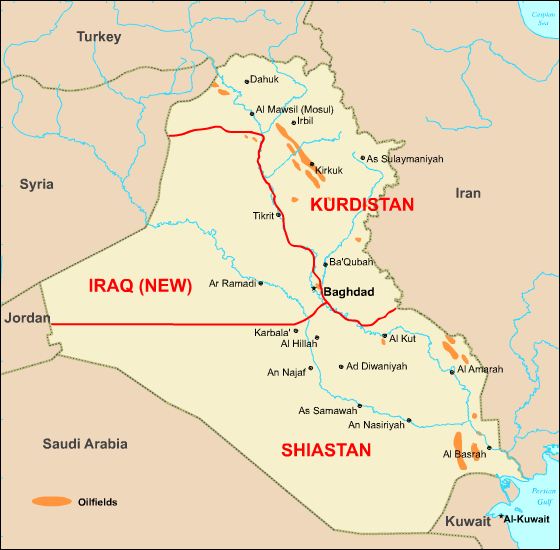I always thought this was a good idea from the start, but I was criticized by so called experts of the status quo. Obviously we tried what those experts wanted and it didn't work.
Kurdishaspect.com - By Baqi Barzani
A longed-for non-binding draft resolution approved by the US senate to partition Iraq into three autonomous enclaves is the most logical and judicious plan ever proposed by any US administration to put an end to the escalating carnage and dissection among the ethnically, religiously and culturally dissimilar Iraqi components. It has been widely embraced by Iraqi people, especially by the Sunnis in the center and the Kurds in Kurdistan. Even though objected by trifling critics, the resolution will aid the conflicting Iraqi political groups to ultimately be able to settle their years old lingering territorial, administrative and governmental discrepancies.
Al-Maliki Shiite party?s antipathy to the resolution and his unilateral call for Iraqi parliament convention session is indicative of his egotism, inaptitude and his skewed decisions without recognizing the inclusive right of seeking consultation from other legitimate constituent members of his coalition government and no regard at all to the interests and rights of the overwhelming majority of Iraqi populace. The Sunnis Arabs have long lamented for being sidelined and subdued by the majority ruling Shiites.
The US senate resolution has been misconstrued. Contrary to some assertions, the all-encompassing adoption and implementation of this constitutionally enshrined decentralization and autonomy law plan will mostly benefit the Sunni Arabs and Shiite Arabs, rather than the ethnic Kurds. It will further legitimize and boost up Shiite-Sunni Arabs? clout and upgrade the economic situation in central and Southern parts of Iraq where the Arabs reside predominately by offering them more political and economic prerogatives.
Since 2003, due to pressure from the US, the Kurds have been goaded into forgoing most of their demands embodying: suspension on referendum on Kurdish Kikruk and disputed territories, hold on revenue and oil laws, compensation plans for displaced individuals, forceful merger of Kurdish military forces with Iraqi Army, acceptance of a federalist system of government and most significantly shying from declaring an independent Kurdish state, presumably jeopardizing US ultimate mission in Iraq.
Some Arabs states expressing antagonism to the late US senate?s partition resolution have contributed absolutely nothing positive to the worsening security and economic state of Iraq as well as the reconstruction of the country. Commentators by Arab media criticizing the resolution, attempting to portray United States intentions in Iraq as imperialistic are absolutely indefensible. The Iraqi Turkoman Fronts claim to seek Turkish military support or the unfounded statement by Muslim Scholar Association in Iraq to incite insurgents to take arms attacks against the Kurds implies their utter disbelief and disrespect to democracy.
Willy-nilly, Kurdistan is a de facto partitioned nation state with ample international support, recognition, economic prosperity and regional stability and authority. Kurdistan has exceeded the level of requisite potential to run its own affairs and could have long promulgated its national independence. What fretting Arab nations should realize is the fact that since 2003, every successive US administration has been more pro-Arab than pro-Kurdish, aimed at enticing Arabs to more dynamically join the national political process. It is the United States that has mainly persuaded the Kurds to coexist with Arabs in a united, federalist, pluralistic Iraq, contrary to the false general notion perceived in the Muslim and Arab world that the United States is encouraging the partition of Iraq and creation of an independent Kurdish state.
It is a warning sign for the Kurds that the moment the US forces shrink back, their freedom could be invaded by radical religious or other nationalist ethnic groups.
Till preceding the Gulf war, the Kurds as well as Arab Shiite did not hold any role in running governments. Due to the lake of practice in administration and imposition of foreign government politics and policies, the numerous Iraqi groups have not been able to reach conclusion on certain major issues. Therefore, a neutral mediatory role in attempting to bring the diverse people closer in resolving their dilemmas and accelerating future US troops? pullout is part and parcel, particularly for the United States, being the key role player.
Americans are the ones offering the most sacrifices in Iraq. Like Joe Biden, the U.S. vice president stated such a division could allow for the withdrawal of U.S. combat troops without too much chaos. Therefore, what is crucial for the US administration to consider is the guaranteed security of US troops as well as ushering in of permanent stability to Iraq, not the irrelevant fears and claims of Arab and regional neighboring countries about a feasible disintegration of Iraq or loss of Iraq?s Arab national identity.
via israpundit.com

